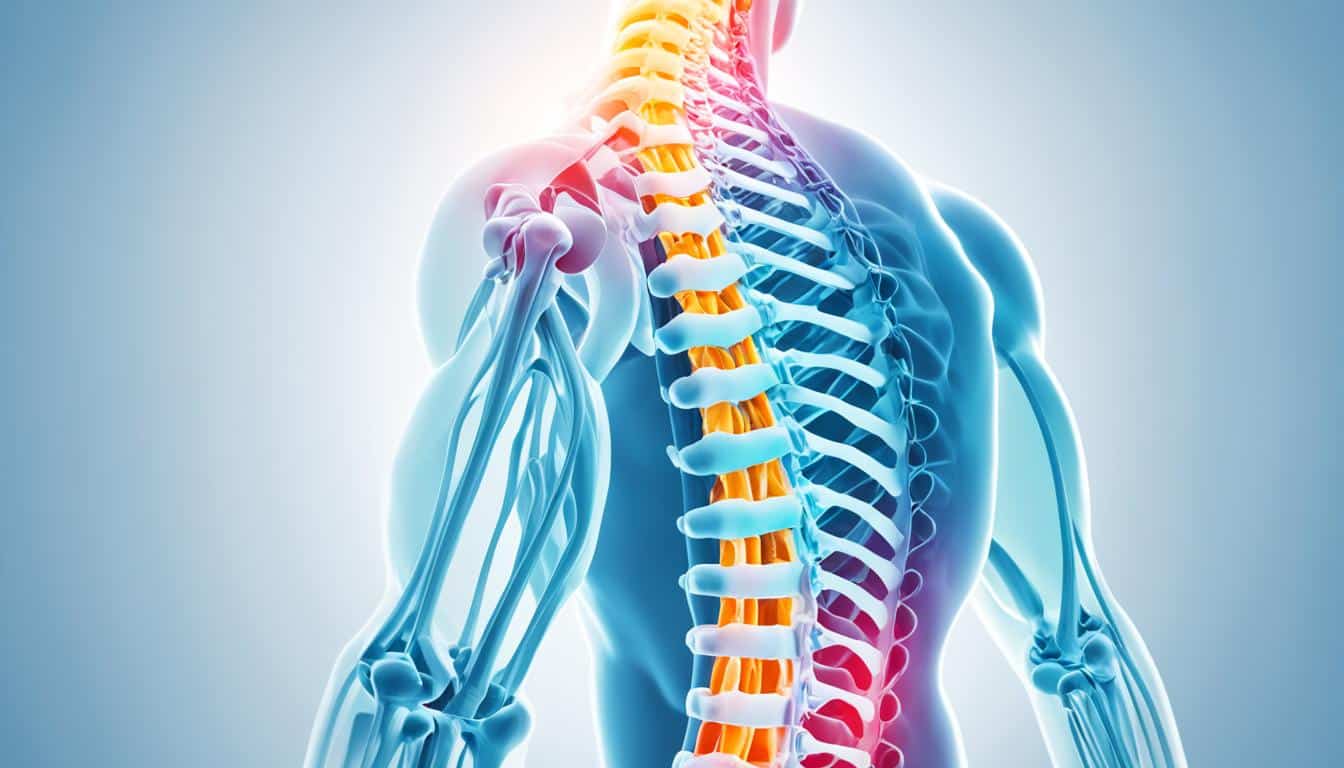Waking up with back pain in the morning is a common occurrence that can disrupt your day before it even begins. If you’ve ever wondered why you experience back pain in the morning or what you can do to find relief, you’re not alone. In this article, we will explore the various causes of morning back pain and provide practical tips for alleviating discomfort so that you can start your day pain-free.
There can be several reasons for morning back pain. Poor sleeping posture, an unsupportive mattress or pillows, underlying medical conditions, over-exercising the day before, improper sleeping posture, or even pregnancy can contribute to this unpleasant experience. Understanding the root cause of your morning back pain is essential for finding effective relief.
- Waking up with back pain in the morning is a common occurrence.
- Poor sleeping posture, an unsupportive mattress or pillows, and underlying medical conditions can contribute to morning back pain.
- Over-exercising, improper sleeping posture, and pregnancy are also possible causes of morning back pain.
- Identifying the cause of your morning back pain is crucial for finding relief.
- Stay tuned as we explore common causes and effective remedies for morning back pain.
Common Causes of Morning Back Pain
Morning back pain can be attributed to various factors, each contributing to discomfort and stiffness upon waking up. Understanding these common causes can help identify the root of the problem and find effective solutions for relief.
Degenerative Disc Disease (DDD)
Degenerative disc disease is a natural wear and tear of the vertebrae and disks in the back. Over time, the discs between the vertebrae become thinner and lose their ability to absorb shock, leading to pain and discomfort. DDD can also cause narrowing of the spinal canal and compression of the spinal nerves, resulting in morning back pain.
Fibromyalgia
Fibromyalgia is a chronic condition characterized by widespread musculoskeletal pain, including the back. People with fibromyalgia often experience tender points on the body and heightened sensitivity to pain. Morning back pain can be a symptom of fibromyalgia, making it crucial to address the underlying condition for relief.
Overdoing Exercise
Physical activity is important for maintaining a healthy back, but overdoing exercise can strain the muscles and lead to morning back pain. Engaging in high-impact activities or lifting heavy weights without proper form can put excessive stress on the back, causing discomfort the following morning.
Improper Sleeping Posture
The way we position our bodies while sleeping can significantly impact our spinal alignment and contribute to morning back pain. Sleeping in an improper posture, such as on the stomach or with an overly twisted spine, can strain the back muscles and lead to discomfort upon awakening.
Unsupportive Mattress
An unsupportive mattress that fails to provide proper spinal alignment can exacerbate morning back pain. A mattress that is too soft or too firm can create pressure points and fail to distribute body weight evenly, leading to discomfort and stiffness in the back.
Addressing these common causes of morning back pain is essential for finding relief and starting the day without discomfort. By identifying the specific factors contributing to the pain, individuals can take proactive steps to alleviate the symptoms and improve their overall well-being.
Relief for Morning Back Pain
Morning back pain can be discomforting and have a significant impact on your daily routine. Fortunately, there are effective ways to find relief and start your day pain-free. Incorporating stretching exercises, adopting the best sleeping positions, and utilizing morning back pain remedies can make a noticeable difference in reducing your pain and improving your overall well-being.
Stretching Exercises
Stretching exercises are a fantastic way to alleviate stiffness and pain in your back. They help improve flexibility and promote blood flow to the muscles, providing relief. Consider incorporating the following stretching exercises into your morning routine:
- Gentle knee-to-chest stretches: Lie flat on your back and bring one knee towards your chest. Hold for 20 seconds and repeat with the other leg.
- Arm reaches: Stand tall with your feet hip-width apart. Extend one arm in front of you and slightly across your body. Hold for 10 seconds and repeat with the other arm.
Remember: Always listen to your body and avoid overstretching. Start slowly and gradually increase the intensity of your stretching routine.
Best Sleeping Positions
Your sleeping position plays a crucial role in preventing and alleviating morning back pain. Here are some tips for finding the best sleeping position for your back:
- If you sleep on your back, consider placing a pillow under your knees to maintain the natural curve of your spine.
- For side sleepers, putting a pillow between your knees can help align your spine and relieve pressure on your back.
- If you prefer sleeping on your stomach, consider placing a pillow under your hips to reduce strain on your back.
Morning Back Pain Remedies
In addition to stretching exercises and proper sleeping positions, there are other remedies that can provide morning back pain relief:
- Take a warm shower immediately after getting out of bed. The warmth helps relax tight muscles and improves circulation.
- Use a firm and supportive mattress that promotes proper spinal alignment. A high-quality mattress is essential for reducing nighttime discomfort and morning pain.
- Practice good posture throughout the day. Sit and stand with proper alignment to minimize stress on your back muscles.
By integrating these relief measures into your daily routine, you can effectively manage and prevent morning back pain, allowing you to start your day feeling refreshed and pain-free.

Tips to Prevent Morning Back Pain
Preventing morning back pain involves adopting certain habits and practices. By implementing the following tips, you can reduce the risk of waking up with back pain and start your day feeling refreshed and pain-free:
- Maintain a Good Sleeping Posture: Sleep in positions that help maintain the natural alignment of your spine. Avoid sleeping on your stomach, as it can strain the back. Instead, sleep on your side or back.
- Use Pillows for Support: Place a pillow between your knees if you are a side sleeper to help keep your spine aligned. For back sleepers, place a pillow under your knees to support the natural curvature of your spine.
- Invest in a Supportive Mattress: Choose a mattress that provides adequate support for your body type and sleeping position. A medium-firm mattress is generally recommended for optimal back support.
- Engage in Regular Exercise: Regular physical activity can help strengthen the muscles that support your spine, reducing the risk of back pain. Include exercises that target the core and back muscles in your fitness routine.
- Maintain a Healthy Weight: Excess body weight can put added stress on your back. By maintaining a healthy weight, you can reduce the strain on your back muscles and decrease the likelihood of morning back pain.
- Practice Stress-Reducing Techniques: Stress can contribute to muscle tension, including in the back. Incorporate stress-reducing activities such as meditation, deep breathing exercises, or yoga into your daily routine.

Following these tips consistently can significantly decrease the occurrence of morning back pain and contribute to better overall spinal health. Remember to consult with a healthcare professional if your back pain persists or worsens despite adopting these preventive measures.
When to Seek Medical Attention
In most cases, morning back pain can be managed at home with self-care measures. However, it is important to contact a doctor if the pain persists or worsens despite these measures. Back pain that does not improve over time may indicate an underlying condition that requires medical attention.
“It’s crucial to reach out to a healthcare professional if morning back pain persists or becomes more severe. They can help diagnose the cause of the pain and provide appropriate treatment.”
There are also certain red flags to watch out for when experiencing morning back pain. If the pain is accompanied by leg muscle weakness, numbness and tingling in the arms and legs, or difficulties with bowel or bladder control, it may indicate a more serious issue. These symptoms could be signs of nerve compression or spinal cord injury, and immediate medical attention is necessary.
Furthermore, if morning back pain interferes with daily activities or causes significant limitations in movement, it is essential to seek medical help. Your doctor can evaluate the extent of your condition and develop an appropriate treatment plan to alleviate your pain and restore your mobility.
Remember, seeking medical attention for morning back pain is necessary when:
- The pain persists or worsens despite self-care measures
- There is leg muscle weakness, numbness and tingling in the arms and legs, or difficulties with bowel or bladder control
- The pain interferes with daily activities or causes significant limitations in movement
By reaching out to a healthcare professional, you can receive an accurate diagnosis and appropriate treatment to address the underlying causes of your morning back pain.
Additional Factors Contributing to Morning Back Pain
While poor sleeping posture, an unsupportive mattress, and underlying conditions like degenerative disc disease and fibromyalgia are common culprits of morning back pain, there are other factors that can contribute to this discomfort. Understanding these additional factors can help you take the necessary steps to alleviate or prevent morning back pain.
Inflammatory Back Pain
Inflammatory back pain is a specific type of chronic pain that is caused by autoimmune diseases such as ankylosing spondylitis. This condition can result in morning stiffness and pain, which can be more pronounced upon waking up. These underlying inflammatory conditions can exacerbate morning back pain symptoms.
Myofascial Pain Syndrome and Fibromyalgia
Myofascial pain syndrome and fibromyalgia are chronic pain conditions that can lead to morning back pain. Myofascial pain syndrome is characterized by trigger points in the muscles, causing localized pain and tenderness. Fibromyalgia, on the other hand, is a widespread pain disorder that can affect the entire body, including the back. Both conditions can result in morning back pain and contribute to overall discomfort.
Insomnia and Poor Quality Sleep
Insomnia and poor quality sleep can worsen back pain symptoms, including morning back pain. When you don’t get enough restful sleep, your muscles can become tense and your body may not properly recover from daily wear and tear. This can lead to increased pain and discomfort in the morning.
Awkward Sleeping Postures
Uncomfortable or awkward sleeping postures can strain the muscles and structures in your back, causing morning pain. Sleeping in positions that put excessive pressure or stress on certain areas of your back can lead to stiffness and discomfort when you wake up.
Chronic Low-Grade Inflammation
Chronic low-grade inflammation, often associated with aging and certain health conditions, can contribute to morning back pain. Persistent inflammation in the body can affect the muscles, joints, and tissues, leading to discomfort and pain.
By understanding these additional factors contributing to morning back pain, you can take proactive measures to address them and improve your overall comfort. Whether it involves managing underlying conditions, improving sleep quality, or adjusting sleeping positions, addressing these factors can help alleviate morning back pain and promote a healthier, pain-free start to your day.
Conclusion
Morning back pain is a common issue that can be caused by a variety of factors. Poor sleeping posture, an unsupportive mattress or pillows, underlying medical conditions, over-exercising, and pregnancy can all contribute to this discomfort.
To find relief from morning back pain, it is crucial to identify the underlying cause. Practicing good sleeping posture, using a supportive mattress, and implementing stretching exercises can help alleviate the pain. Additionally, maintaining a healthy lifestyle through regular exercise, maintaining a healthy weight, and managing stress can reduce the risk of morning back pain.
If the pain persists or is accompanied by other concerning symptoms, it is important to seek medical attention for a proper diagnosis and treatment. A healthcare professional can provide guidance and recommend appropriate measures to address the underlying cause of morning back pain.
FAQ
Why do I experience back pain in the morning?
Morning back pain can occur due to factors such as poor sleeping posture, an unsupportive mattress or pillows, underlying medical conditions, over-exercising the day before, or pregnancy.
What are the common causes of morning back pain?
Common causes of morning back pain include degenerative disc disease, fibromyalgia, overdoing exercise, improper sleeping posture, and using an unsupportive mattress.
How can I find relief from morning back pain?
Stretching exercises, taking a warm shower, using supportive pillows, and choosing a supportive mattress can help alleviate morning back pain.
What are some tips to prevent morning back pain?
To prevent morning back pain, it is important to maintain good sleeping posture, use supportive pillows, sleep on a supportive mattress, exercise regularly, maintain a healthy weight, and practice stress-reducing techniques.
When should I seek medical attention for morning back pain?
If the pain persists or worsens despite self-care measures, is accompanied by other concerning symptoms, interferes with daily activities, or causes significant limitations in movement, it is important to contact a doctor.
What are some additional factors that can contribute to morning back pain?
Additional factors include inflammatory back pain, myofascial pain syndrome, fibromyalgia, insomnia, awkward sleeping postures, and chronic low-grade inflammation.








